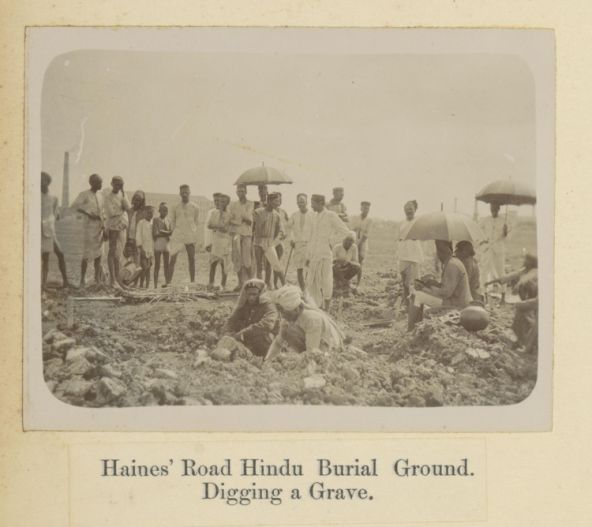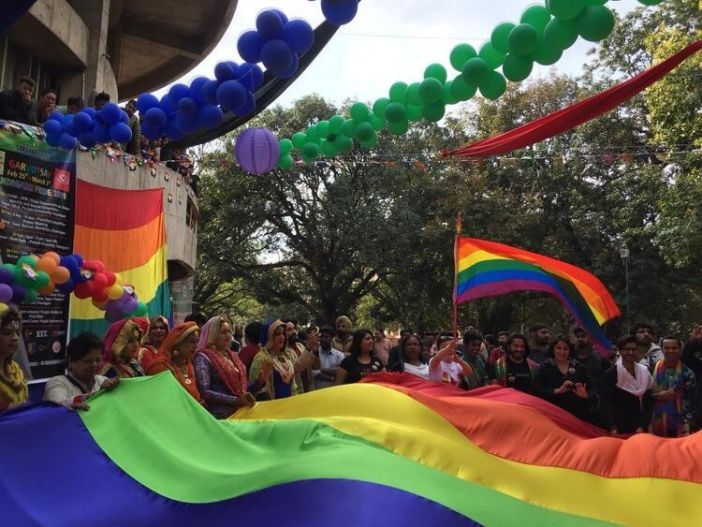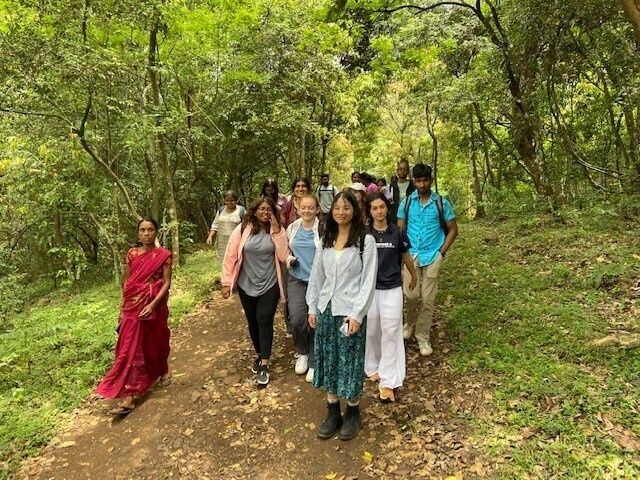South Asia Program
Theory from the Trenches: Decolonization and the Promise of Subaltern Marxism

March 24, 2025
12:15 pm
Uris Hall, G08
Talk by Shozab Raza (Anthropology, University of Toronto)
In recent years, we have seen renewed efforts to “decolonize.” From the toppling of statues to the revision of disciplinary canons, much of this effort has focused on overturning colonial residues in our cultural and epistemological landscapes. This talk offers a radically different vision of decolonization — one driven not by bureaucrats, professors or social media activists, but by subaltern actors, a vision that was at once global and local, dedicated equally to dismantling the less visible structures of political economy as it was to fighting epistemic battles. I focus on how landless peasants in Pakistan — participating in a global communist movement stretching from Oakland to Saigon, from the Atlantic to the Indian Ocean — reinvented revolutionary theory in their struggles against imperialist political economies. Joining a Mao-inspired party in the 1970s, these peasants not only occupied colonially-established estates (jagirs), but also acquired a meta-recognition that “theory” — now an emic category — was essential to global revolution. Some peasants retheorized Eurocentric Marxisms through the lens of Sufi Islam, while others developed theories of communist becoming inspired by Baloch tribal norms. I conceptualize these subaltern experiments in theory-making as trench theory, with the trench metaphor flagging a mode of subterranean theorizing grounded in political combat. Ultimately, this talk shows how subaltern actors drew on ideas spanning intellectual traditions, borders, and oceans to generate trench concepts aimed at heralding nothing short of a worldly, even other-worldly, liberation.
Shozab Raza is an Assistant Professor of Social Justice Education, with a cross-appointment in Anthropology, at the University of Toronto, and a 2024-25 Fung Global Fellow at Princeton University. He was previously an Agrarian Studies Fellow at Yale University and completed his graduate training at the University of Toronto and the University of Oxford. As a historical anthropologist, his research and teaching focuses on revolutionary political imaginaries and political economy as these unfold across Asia, the Indian Ocean, and beyond. He is finalizing his book manuscript, Theory from the Trenches, which explores how colonial residues and capitalist transformations inspire not only political but also theoretical insurgencies from below. Shozab’s research has been published in several journals, including Cultural Anthropology and Comparative Studies in Society and History, while his public writing has appeared in venues like The Guardian, Boston Review, and Red Pepper. He is also a founding editor of Jamhoor, a movement-oriented Leftist magazine focused on South Asia and its diasporas.
Additional Information
Program
Einaudi Center for International Studies
South Asia Program
The Violence of Recognition: Adivasi Indigeneity and Anti-Dalitness in India

February 24, 2025
12:15 pm
Uris Hall, G08
Talk by Pinky Hota (Anthropology, Smith College)
The Violence of Recognition explores the roots of ethnonationalism conflict between two historically marginalized groups—the Kandha, who are Adivasi (tribal people considered indigenous in India), and the Pana, a community of Christian Dalits (previously referred to as “untouchables”). Hota documents how Hindutva mobilization led to large-scale violence, culminating in attacks against many thousands of Pana Dalits in the district of Kandhamal in 2008. Bringing Indigenous studies as well as race and ethnic studies into conversation with Dalit studies, Hota shows that, despite attempts to frame these ethnonationalist tensions as an Indigenous population’s resistance against disenfranchisement, Kandha hostility against the Pana must be understood as anti-Christian, anti-Dalit violence animated by racial capitalism. Hota’s analysis of caste in relation to race and religion details how Hindu nationalists exploit the singular and exclusionary legal recognition of Adivasis and the putatively liberatory, anti-capitalist discourse of indigeneity in order to justify continued oppression of Dalits—particularly those such as the Pana. By showing how indigeneity works as a political technology that reproduces the political, economic, and cultural exclusion of landless marginalized groups such as Dalits, The Violence of Recognition reveals the violent implications of minority recognition in creating and maintaining hierarchies of racial capitalism.
Pinky Hota is an Associate Professor of Anthropology at Smith College, with affiliations with the Program for the Study of Women and Gender and South Asian Studies. Her research has been funded by the Wenner-Gren and Charlotte W. Newcombe Foundations, and published in Modern Asian Studies, Anthropological Quarterly, and Political and Legal Anthropology Review. Her research interests lie in caste and race, religion, technology and capital, and extractive economies. The Violence of Recognition, published by University of Pennsylvania Press in 2023, is her first book.
Additional Information
Program
Einaudi Center for International Studies
South Asia Program
A Subaltern Crematorium of India? Bombay, 1918 – 1953

February 10, 2025
12:15 pm
Uris Hall, G08
Talk by Sohini Chattopadhyay (History, Union College)
In May 1939, a 20-year-old man died in Bombay’s suburb of Vile Parle. He was a migrant worker, often without a home, and Dalit. His friends took his body to a cremation ground, but only by trespassing it at night since Dalits were not allowed access to the cremation ground that offered traditional funerals for dominant caste Hindus. Seemingly unconnected, the same year, the Bombay Legislative Council introduced a proposal to have a public electric crematorium in the city, which would be accessible to all. This paper links incidents of civil disobedience, such as the one in Vile Parle, to the political and social forces behind the establishment of Bombay’s first public electric crematorium. By analyzing these acts of resistance within the broader context of labor and anti-caste movements and a simultaneous comfort with new death technologies, the paper illuminates the complex interplay between public health infrastructure, colonial governance, and the struggle for social justice. The electric crematorium, as a response to these tensions, emerges as both a symbol of technological progress and a tool for social equality, highlighting the intertwined histories of caste, technology, and urban development in colonial Bombay.
Sohini Chattopadhyay (she/her) is currently an Assistant Professor of History at Union College. Her current book project, tentatively titled "Dead Labor: Comparative Histories of the Electric Crematorium in Colonial Bombay and Calcutta", tracks the intersections between technologies and social histories to underscore the connected and divergent patterns of urbanization in South Asia. Alongside courses in South Asian history and history of science, Sohini has also designed team-taught courses with the engineering school as part of the Science and Technology Studies Program. She received a PhD in History from Columbia University in 2023 and also holds an MA from Jawaharlal Nehru University in New Delhi, India. Sohini is also invested in public history. She was the founding editor of the web journal Borderlines and is now developing its advisory board. She frequently contributes articles on public health, social policies, and South Asian history on Indian digital media platforms.
Additional Information
Program
Einaudi Center for International Studies
South Asia Program
Exploring Intersectional and Syndemic Barriers to HIV Care Among Transgender Women in Mumbai and New Delhi, India

February 3, 2025
12:15 pm
Uris Hall, G08
Talk by William Lodge, II (Public Policy, Cornell University)
This presentation delves into the intersectional and syndemic barriers affecting HIV care among transgender women and Hijras (TGW) in India. Drawing on findings from a multi-method study conducted in Mumbai and New Delhi, the talk illustrates how compounded multilevel barriers—including mental health conditions, intersecting forms of stigma, and economic marginalization—impede effective HIV care for TGW. Utilizing quantitative and qualitative insights, the presentation sheds light on how these challenges intersect and magnify each other, further hindering ART adherence and viral suppression. The presentation aims to contribute to a body of knowledge that informs policy and promotes a responsive and inclusive HIV care model tailored to TGW in India.
William Lodge II is an assistant professor at the Cornell Brooks School of Public Policy and a National Institutes of Health (NIH) FIRST Faculty Fellow. A behavioral and social scientist, Dr. Lodge is dedicated to advancing health equity and improving HIV prevention and care among gender and sexual minorities in the U.S. and globally. Dr. Lodge’s research integrates syndemic theory and intersectionality to understand and address multilevel barriers in HIV prevention and care by focusing on how social and structural determinants—such as stigma and discriminatory policies—shape health outcomes, particularly emphasizing marginalized communities in India and the U.S.
Additional Information
Program
Einaudi Center for International Studies
South Asia Program
Shifting Landscapes: A Conversation with the Cornell Community on Migration and Trump-Era Policy Changes

November 21, 2024
12:00 pm
The recent U.S. election is likely to have significant impacts on immigration policy and practices. Based on experience with the previous Trump administration and standing efforts among Republicans in Congress, these changes may impact Cornell students, staff, and faculty. Join Cornell’s Migrations Program in a conversation about the current state of immigration policy.
This is a virtual-only meeting open to Cornell faculty, staff, and students. Registration is required.
Panelists
Shannon Gleeson, School of Industrial and Labor Relations and Brooks School of Public PolicyLaura Taylor, Director of International ServicesStephen Yale-Loehr, Cornell Law SchoolModerator
Wendy Wolford, Vice Provost for International Affairs and Robert A. and Ruth E. Polson Professor of Global Development in the College of Agriculture and Life SciencesHost and Sponsors
The Migrations Program, part of the Mario Einaudi Center for International Studies, builds upon the work of Migrations: A Global Grand Challenge to inform real-world policies and outcomes for populations that migrate.
Additional Information
Program
Einaudi Center for International Studies
Migrations Program
Reppy Institute for Peace and Conflict Studies
East Asia Program
Southeast Asia Program
Latin American and Caribbean Studies
Institute for African Development
Institute for European Studies
South Asia Program
Information Session: Laidlaw Research and Leadership Program

December 4, 2024
5:00 pm
Uris Hall, G08
The Laidlaw Undergraduate Leadership and Research Program promotes ethical leadership and international research around the world—starting with the passionate leaders and learners found on campuses like Cornell. Open to first- and second-year students, the two-year Laidlaw program provides generous support to carry out internationally focused research, develop leadership skills, engage with community projects overseas, and become part of a global network of like-minded scholars from more than a dozen universities. We’ll also share tips for approaching potential faculty research mentors and writing a successful application.
Can’t attend? Contact laidlaw.scholars@cornell.edu.
***
The Mario Einaudi Center for International Studies hosts info sessions for graduate and for undergraduate students to learn more about funding opportunities, international travel, research, and internships. View the full calendar of fall semester sessions.
Additional Information
Program
Einaudi Center for International Studies
Reppy Institute for Peace and Conflict Studies
East Asia Program
Southeast Asia Program
Latin American and Caribbean Studies
Institute for African Development
Institute for European Studies
South Asia Program
Migrations Program
Summer Program in India Info Session

November 20, 2024
5:15 pm
Rockefeller Hall, 183
Are you interested in the intersection of mental health and culture, global health, and community engagement? Do you want to gain field research skills and learn about indigenous communities in South India’s beautiful and fragile Nilgiris Biosphere Reserve? If so, the Cornell-Keystone Nilgiris Field Learning Program might be for you!
Additional Information
Program
Einaudi Center for International Studies
South Asia Program
Global Internships and Laidlaw

Students Showcase International Work
Over 70 undergraduates learned career-shaping lessons in the field last summer. Find out how to apply for 2025 Global Internships and Laidlaw.
Additional Information
Global Cornell Experience Showcase

November 19, 2024
4:00 pm
Physical Sciences Building, Baker Portico & Atrium
Over 70 undergraduate students will present their international summer experiences in a poster session. Their work includes conducting research, working in Global Internships, and putting leadership into action as Laidlaw scholars.
The poster session will be in the Baker Portico & Atrium of the Physical Sciences Building. Light refreshments will be served.
Applications for Global Internships are open now. Applications for the Laidlaw Scholars Program will open on November 15.
Global Internships give undergraduate students valuable international experience in fields spanning global development, climate and sustainability, international relations, communication, business, governance, and more. They are managed by the Mario Einaudi Center for International Studies and Office of Global Learning, both part of Global Cornell.
The Laidlaw Undergraduate Leadership and Research Scholarship Program provides generous funding to first- and second-year undergraduates over two years as they pursue internationally focused research, engage in leadership training and a leadership-in-action experience, and join a global network of like-minded peers. The program is managed by the Einaudi Center.
Additional Information
Program
Einaudi Center for International Studies
Reppy Institute for Peace and Conflict Studies
East Asia Program
Southeast Asia Program
Latin American and Caribbean Studies
Institute for African Development
Institute for European Studies
South Asia Program
Migrations Program
Information Session: Laidlaw Research and Leadership Program

November 13, 2024
12:00 pm
The Laidlaw Undergraduate Leadership and Research Program promotes ethical leadership and international research around the world—starting with the passionate leaders and learners found on campuses like Cornell. Open to first- and second-year students, the two-year Laidlaw program provides generous support to carry out internationally focused research, develop leadership skills, engage with community projects overseas, and become part of a global network of like-minded scholars from more than a dozen universities. We’ll also share tips for approaching potential faculty research mentors and writing a successful application.
Register for the virtual session.
Can’t attend? Contact laidlaw.scholars@cornell.edu.
***
The Mario Einaudi Center for International Studies hosts info sessions for graduate and for undergraduate students to learn more about funding opportunities, international travel, research, and internships. View the full calendar of fall semester sessions.
Additional Information
Program
Einaudi Center for International Studies
Reppy Institute for Peace and Conflict Studies
East Asia Program
Southeast Asia Program
Latin American and Caribbean Studies
Institute for African Development
Institute for European Studies
South Asia Program
Migrations Program
